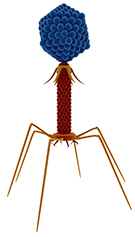The Virus in Your Mucus

Dave: If you've been around young boys, you know they like to talk about disgusting bodily fluids like mucus, and we're about to do just that.
Norbert: Is that because neither of us has grown up?
Dave: No, dummy, it's because mucus if one of our most valuable lines of defense against germs because it provides a protective layer.
For the first time, scientists discovered that our mucus contains viruses called bacteriophage or phage that protect us from harmful bacteria.
Norbert: Wait a minute; there are viruses that attack bacteria?
Dave: Viruses infect every living thing on earth including bacteria, even other viruses.
In the case of mucus, scientists found forty phage for every bacterium, but just millimeters away, where there's no mucus, the ratio drops to five to one.
So, are these phages protecting us? To find out, researchers grew two types of lung tissue in the lab, one that produced mucus and one that couldn't.
Once infected with bacteria, half the cells in both cultures died. But when bacteria-killing phage was added, the survival of the lung cells skyrocketed in the mucus culture. They also noticed the outside of phage is studded with antibody like proteins that keep it attached to carbohydrates in the mucus. This helps keep phage where bacteria are likely to be. Perhaps our bodies have adapted carbohydrates in our mucus to select for phages that protect us, creating a symbiotic relationship.
Next scientists want to understand how this affects our body's balance of microbial populations and diseases such as obesity and inflammatory bowel diseases. With so few examples of beneficial viruses, this is an important one to study.
More Information
Bacteriophage
Encyclopedia Britannica's entry on bacteriophage
Phages
Everything about bacteriophage
Viruses and mucus team up to ward off bacteria
"Phages may play unforeseen role in immune protection."
Viruses in the gut protect from infection
"Phages in mucus aid immune system by killing invading bacteria."